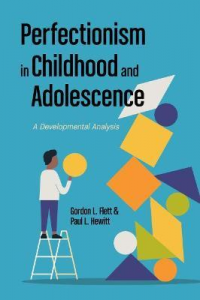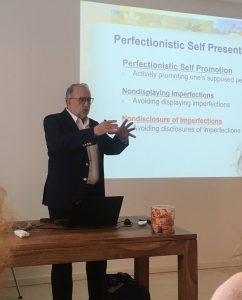2022
“Psychology Works” Fact Sheet: Perfectionism
The Canadian Psychological Association created this animation based on the “Psychology Works” Fact Sheet on perfectionism developed by Dr. Paul Hewitt, Sabrina Ge, and Dr. Gordon Flett. The fact sheet discusses the psychological, interpersonal, and achievement-related components of perfectionism.
Dr. Hewitt’s New Book
Perfectionism is growing more prevalent among young people today, with increasing numbers of children admitting they feel pressure to be, or appear to be, perfect.
This book describes perfectionism’s mental health costs and effects on achievement, explaining the myriad and often surprising ways children and adolescents exhibit perfectionism in their family, school, and social environments. Most importantly, the authors suggest clinical interventions to help perfectionistic children regain perspective, and accept their limitations.
Authors Gordon L. Flett and Paul L. Hewitt expertly summarize relevant studies, demonstrating that perfectionism is pernicious and requires a complex and multi-faceted approach to prevention and treatment. A clinically-focused section rounds out the book, with concrete steps counselors and educators can take to help build resilience and adaptability.
Purchase the book on Amazon or APA Books today!
2021
Workshops in Italy
Dr. Hewitt is frequently teaching and giving workshops on clinical psychology in Italian cities, namely Florence in Bergamo. See him in action here!
2020
Dr. Hewitt’s Upcoming Book

This book presents a comprehensive, evidence-based treatment that combines individual case formulation with group interventions informed by contemporary psychodynamic and interpersonal theories.
Designed as a manual for training and teaching, this book shows how group psychodynamic-interpersonal psychotherapy (GPIP) practitioners combine knowledge of the interpersonal factors that underlie each patient’s symptoms, with a sound understanding of group process theory and stages of group development, to effect real and lasting change.
Chapters include a wealth of hands-on tools including practice guides, self-study quizzes, clinical vignettes, and reflective questions. The authors also provide instructions on process and progress monitoring, which allows therapists to access timely feedback about the functioning of the group and each patient, improving their outcomes by highlighting what is working and what needs to change.
About the Authors
Giorgio A. Tasca, PhD, is a full-time professor in the School of Psychology, University of Ottawa, Canada, and director of the Psychotherapy Practice Research Network. He is past president of APA Division 49 (Society of Group Psychology and Group Psychotherapy), an APA fellow, and editor of Group Dynamics. Dr. Tasca teaches at l’universita degli studi di Bergamo, and is scientific director of la Scuola Psicoterapia Integrata in Bergamo, Italy. He conducted several randomized controlled trials of group psychotherapy and published on advanced statistical modeling for group research. He lives in Ottawa, Canada. Visit his University of Ottawa profile page and follow @giorgiotasca.
Samuel F. Mikail, PhD, is an adjunct faculty member at the University of Waterloo and maintains a private practice in Newmarket, Canada. He is a clinical psychologist registered with the College of Psychologists of Ontario with more than 25 years of experience in adult clinical, health, and rehabilitation psychology. Dr. Mikail was a founding member of the Ottawa Group Psychotherapy Association and served as a presidential officer of the Canadian Psychological Association (2017–2020). He has published numerous articles in peer reviewed journals and books spanning the fields of mental health, health psychology, chronic pain, and disability and rehabilitation. Visit his website here.
Paul Hewitt, PhD, is a professor of psychology at the University of British Columbia, Canada. He is a Fellow of the Canadian Psychological Association and has been cited as one of the top 10 Canadian clinical psychology professors for research productivity. He has published numerous books, chapters, and journal articles on perfectionism, psychopathology, and psychotherapy.
Additionally, the cover of this book is painted by none other than Dr. Hewitt’s wife, Barbara Calvert!
Preorder now from APA Books, Amazon, Bookshop, or Login Canada! Available as ebook (Kindle) and paperback editions.
2018
Perils of Perfectionism
This animation about the perils of perfectionism was created by the Motivation, Performance, and Wellbeing Research Group with support and resources provided by perfectionism research partners including Dr. Paul Hewitt and the Perfectionism and Psychopathology Lab.
APA Psychotherapy Video Series
PsycTHERAPY
2017
Dr. Hewitt’s New Book is Available!
 Grounded in decades of influential research, Dr. Paul Hewitt’s new book Perfectionism: A Relational Approach to Conceptualization, Assessment, and Treatment thoroughly examines perfectionism: how it develops, its underlying mechanisms and psychological costs, and how to target it effectively in psychotherapy.
Grounded in decades of influential research, Dr. Paul Hewitt’s new book Perfectionism: A Relational Approach to Conceptualization, Assessment, and Treatment thoroughly examines perfectionism: how it develops, its underlying mechanisms and psychological costs, and how to target it effectively in psychotherapy.
Dr. Hewitt and his co-authors describe how perfectionistic tendencies—rooted in early relational and developmental experiences—make people vulnerable to a wide range of clinical problems. They present an integrative treatment approach and demonstrate ways to tailor interventions to the needs of individual clients.
Throughout the book, vivid clinical illustrations make the core ideas and techniques concrete. In addition, a group treatment model is detailed and state-of-the-art assessment tools are discussed in this book.
Buy a copy today through Guilford Press!
What others are saying
 “This book could be a career saver for narrowly trained recent graduates who have discovered they need a greatly expanded repertoire to cope with clinical reality. Steeped in research and rich with clear examples from clinical practice, the book shows how the destructive ‘trait’ of perfectionism can be better understood in interpersonal and intrapsychic terms that are directly related to family history, social context, and more. It includes very informative discussions of how to use the authors’ integrative approach in individual and group therapy.”
“This book could be a career saver for narrowly trained recent graduates who have discovered they need a greatly expanded repertoire to cope with clinical reality. Steeped in research and rich with clear examples from clinical practice, the book shows how the destructive ‘trait’ of perfectionism can be better understood in interpersonal and intrapsychic terms that are directly related to family history, social context, and more. It includes very informative discussions of how to use the authors’ integrative approach in individual and group therapy.”
—Lorna Smith Benjamin, PhD, ABPP, Department of Psychology (Emeritus), University of Utah
“The authors have made enormous contributions to our understanding of perfectionism, an affliction that permeates our culture and is implicated in a plethora of mental disorders. This definitive volume lays out their transdiagnostic model of perfectionistic behavior and how to treat it. The best and most comprehensive volume on perfectionism, this is a ‘must read’ for scholars and clinicians who study and treat all forms of psychopathology.”
![]() —Randy O. Frost, PhD, Harold and Elsa Siipola Israel Professor of Psychology, Smith College
—Randy O. Frost, PhD, Harold and Elsa Siipola Israel Professor of Psychology, Smith College
About the authors
Paul L. Hewitt, PhD, is Professor in the Department of Psychology at the University of British Columbia, Canada. He is a Fellow of the Canadian Psychological Association and of the Association’s Section on Clinical Psychology. Dr. Hewitt was recently cited as one of the top 10 Canadian clinical psychology professors for research productivity. He has published well over 200 research papers, books, and chapters on perfectionism, psychopathology, and psychotherapy, and has conducted collaborative work on perfectionism with Gordon L. Flett since 1989. He has a private practice in clinical psychology, consults with numerous organizations, and is regularly asked to speak at national and international conferences on perfectionism research and treatment.
Gordon L. Flett, PhD, is Professor in the Department of Psychology at York University in Toronto, Ontario, Canada, where he holds a Canada Research Chair in Personality and Health and is Director of the LaMarsh Centre for Child and Youth Research. Formerly, he was Associate Dean of Research and Graduate Education in the Faculty of Health. Dr. Flett is a Fellow of the Association for Psychological Science, which has cited him as one of the top 25 most productive authors in psychology. Best known for his research on personality and depression, as well as his collaborative work on perfectionism with Paul L. Hewitt since 1989, he has been the guest editor of several special journal issues on perfectionism.
Samuel F. Mikail, PhD, ABPP, maintains a private clinical psychology practice in Newmarket, Ontario, Canada; consults to private insurers on mental health disability claims; and is an adjunct clinical faculty member at the University of Waterloo. He is a Fellow of the Canadian Psychological Association (CPA) and of the CPA’s Section on Clinical Psychology. His clinical writing and research publications have spanned the fields of mental health, health psychology, rehabilitation, and spirituality. Dr. Mikail serves on the Board of Directors of the CPA, where he is Practice Chair and Chair of Professional Affairs. He received the award for Excellence in Professional Psychology Training from the Canadian Council of Professional Psychology Programs and was recognized for Outstanding Contributions to Clinical Training by the Royal Ottawa Health Care Group.
2016
The Perfectionism & Psychopathology Lab is UBC Psychology’s February Lab of the Month

The Perfectionism & Psychopathology Laboratory Team
Dr. Paul Hewitt, professor and clinical psychologist in the Department of Psychology, has been researching and treating perfectionism for over 25 years. He is the Principal Investigator of the Perfectionism & Psychopathology Laboratory. This clinical lab investigates perfectionism, defined as a transdiagnostic personality vulnerability factor, as well as its association with psychological and physical health outcomes, its influence on treatment, and the psychotherapeutic treatment of perfectionism.
Dr. Hewitt, a pioneer in perfectionism research and treatment, has conducted extensive research on the construct of perfectionism as a maladaptive and multidimensional personality trait. His research has linked perfectionism to a variety of forms of psychopathology, including anxiety, depression, and personality disorders, suicidal behaviours in children, adolescents, and adults, disordered eating and sexuality, and both achievement and relationship difficulties. Moreover, he has developed a psychodynamic psychotherapeutic treatment for perfectionism that has been shown empirically to be effective.
In this Q&A, Dr. Hewitt shares the research and treatment taking place in his lab, his insights into the perfectionism trait, and the lab’s personality.
To start, can you describe the general personality of a perfectionist?
Simply stated, it is someone who requires perfection of the self and/or others. They are also attempting to perfect the self. These are generally individuals who live pretty unhappily and have dissatisfied lives. They seemingly have learned that the route to social connection is to fit in with the world, and to have self-worth is by being perfect or by appearing to others as perfect.
Can the average person relate?
I believe people generally can relate to this idea as either pertaining somewhat to him or herself or to people they know. Whenever I do public lectures, I normally have many who comment that the description of the perfectionism construct accurately captures their loved ones who are living rather tortured lives.

The Lab’s Group Therapy Room
What is the lab’s main research focus?
There are numerous focuses in the research we are currently doing. First, we continue to explore some of the maladaptive outcomes from perfectionistic behaviour. For example, we are currently analyzing a large dataset of 450 community members across the adult age span to look at how perfectionism creates a vulnerability to suicide as well as physical health concerns. A second focus is to evaluate a model of perfectionism (the Perfectionism Social Disconnection Model) which proposes that perfectionism develops from early childhood relational experiences and family constellations, and that the perfectionism arises in an attempt to establish social connectedness and self-worth.

The Lab’s Observation Room
The model further states that although the person attempts to connect with others by being perfect or appearing to be perfect to others, the perfectionistic behavior actually creates social distance, alienation, and a sense of being alone and separate from others. This is a perfect example of the neurotic paradox! We have numerous projects underway assessing components of the model. A third focus is on treatment of perfectionism, and although we completed a very large psychodynamic group treatment research program, we are also attempting to refine this treatment and evaluate the impact of perfectionism on other forms of psychotherapy. Finally, a fourth focus involves evaluating the early relational experiences and development of attachment behaviors that we believe underlies the development of perfectionistic behavior.
One of the many assessment tools you have developed is the Perfectionistic Self-Presentation Scale (PSPS), a measure of the interpersonal expression of perfectionistic behaviour. What led you to develop the PSPS?
Early in the process of trying to explicate and measure the perfectionism construct, the work in my lab focused on trait elements of perfectionism and we developed a model and measure of three
independent perfectionism traits (self-oriented, other-oriented, and socially prescribed perfectionism). In addition, because there is an important interpersonal component to perfectionistic behaviour, we extended the model to incorporate not just perfectionism traits but also the interpersonal expression of those traits. That is, the traits involve preoccupation and concern with being perfect, whereas perfectionistic self-presentation involves attempts to communicate one’s purported “perfection” to others. A third component involves a self-relational component (i.e., the relationship one has with one’s self) that involves self-recriminations, demands for one’s own perfection and so forth. We have incorporated all three elements in a descriptive model of perfectionistic behaviour and developed measures of each the components for adults and children.

How did you become interested in this line of research?
I was working on a paper as a third-year undergraduate student at the University of Manitoba. After reading an article in a magazine about perfectionism I was curious to see what research had been done and I discovered that there wasn’t any empirical research on perfectionism. Now there are thousands of papers published. I wrote that third-year paper and continued my focus on perfectionism with my honours thesis, my MA, PhD, clinical work, and I have never stopped.
Can you tell us about any new research that you are particularly excited about?
I’m excited about new treatment research that I’ve been developing over the years where I’ve been studying early development and early attachment in small children and parents and how that relates to developing perfectionism as a child.
You have a number of people either working or volunteering in this lab. Can you give any insights into its popularity?
This type of research resonates with people. We have undergraduate research assistant and volunteers, directed studies and many graduate students. A majority of the people in the lab are currently focused on treatment related research and work. The lab tends to attract both hard working and fun loving people, which may be more of a function of the make-up of the graduate students who are incredibly giving of their time and energy to make the lab an interesting place. As well, there is a real clinical flavor to all the work in the lab which is quite attractive to many students.
What are other members of your lab working on?
I’ll let the lab members speak for themselves:
Xiaolei Deng, Second year MA: My research focuses on the treatment outcome of perfectionism and whether CBT (cognitive behavioural therapy) and psychoeducation produce changes in symptoms but are not so effective with changes at a deeper trait level with perfectionism. As well, I am also trying to understand the relationship between perfectionism and conception of the self through the use of implicit methodologies.
Silvain Dang, Second year PhD: Sexuality, like perfectionism, is closely tied to our emotionally intimate relationships. My research focuses on how perfectionism can be a mechanism through which early attachment experiences and current romantic relationships can impact the development of sexual difficulties and problems. I am particularly interested in how perfectionism can interact with cultural differences in sexual attitudes and expressions.
Lisa Zhang, Second year PhD: My research focuses on how perfectionism affects the process, as well as the outcome, of group therapy by examining the relationship between perfectionism and the therapeutic relationship, group cohesion, and self-disclosure in the context of group treatment.
Chang Chen, Fourth year PhD: Broadly speaking, my research lies at the intersection of personality, social, and clinical psychology. My current research projects aim to address the following questions: (1) how is perfectionism manifested and expressed in the interpersonal context, such as family relationships, friendships, and romantic relationships? And (2) what developmental and social factors might contribute to individual differences in perfectionism? I am also interested in clinical treatment of psychological problems related to perfectionism.
Janet Kaldas, Sixth year PhD and currently on residency: My primary research examines the relationship between perfectionism and interpersonal dimensions in the process of group therapy over sessions. In other words, I am trying to understand the mechanism by which perfectionistic patients have difficulty benefiting from treatment. I am also interested in understanding the association between perfectionism and several psychological difficulties, such as suicide, shame, stress, and troubles seeking help.
Joanne (Yuan) Zhou, Fourth year undergraduate honours student: My honours project is looking at how perfectionism influences the therapeutic alliance in the context of psychodynamic group treatment and subsequent treatment outcomes.
Briana Smirfitt, Fourth year undergraduate student: My current research examines the relationship between perfectionism, social relationships, and disordered eating behaviours.
Lastly, what does the lab do for fun?
Work, work, work…but also we meet for lab meetings that tend to be quite supportive and, a lot of times, quite a fun time. We will also have the odd potluck lab meeting and lunches off campus. We have some real extraverts who are very focused on making sure people are both working hard and enjoying themselves.

Meeting with the Lab Team




 Perfectionism, or the tendency to demand or require perfection for oneself or others can be seen as an attempt to gain acceptance and avoid rejection or abandonment. Simultaneously, however, perfectionism can interfere with the establishment and maintenance of interpersonal connections and close relationships.
Perfectionism, or the tendency to demand or require perfection for oneself or others can be seen as an attempt to gain acceptance and avoid rejection or abandonment. Simultaneously, however, perfectionism can interfere with the establishment and maintenance of interpersonal connections and close relationships. In this video, Dr. Paul Hewitt demonstrates a dynamic relational therapy approach with a female graduate student whose parents immigrated to the United States from Mexico. The client presents with concerns related to anxiety and perfectionism. The therapist helps the client explore the psychodynamic and relational underpinnings of her issues, including her relationships with her parents and her brother. They also explore the client’s experiences in graduate school, as well as the recent buildup of responsibilities and stress that has come with motherhood. Dr. Hewitt demonstrates the collaborative approach characteristic of dynamic relational therapy in helping the client gradually build an understanding (clinical formulation) of her perfectionistic behavior as a strategy to get her needs met. The therapist and client also explore the client’s cyclical relational pattern, including how it manifests during the course of the therapy session. Throughout the session, Dr. Hewitt helps the client recognize the importance of paying closer attention to her internal emotional experience, and the value of sharing that experience with others.
In this video, Dr. Paul Hewitt demonstrates a dynamic relational therapy approach with a female graduate student whose parents immigrated to the United States from Mexico. The client presents with concerns related to anxiety and perfectionism. The therapist helps the client explore the psychodynamic and relational underpinnings of her issues, including her relationships with her parents and her brother. They also explore the client’s experiences in graduate school, as well as the recent buildup of responsibilities and stress that has come with motherhood. Dr. Hewitt demonstrates the collaborative approach characteristic of dynamic relational therapy in helping the client gradually build an understanding (clinical formulation) of her perfectionistic behavior as a strategy to get her needs met. The therapist and client also explore the client’s cyclical relational pattern, including how it manifests during the course of the therapy session. Throughout the session, Dr. Hewitt helps the client recognize the importance of paying closer attention to her internal emotional experience, and the value of sharing that experience with others. In this session, Dr. Paul Hewitt demonstrates dynamic relational therapy with an undergraduate student who presents with concerns related to perfectionism, impression management, and grief. The therapist helps the client explore her tendency to manage others’ impressions of her and her desire to always want to fit in. They also discuss the client’s upbringing in a low-income, single-parent household, her mother’s long-term sickness and eventual death, her father’s incarceration, and the client’s experience with bullying as a young child. Dr. Hewitt works collaboratively with the client to begin building a clinical formulation and identifying the client’s cyclical relational patterns throughout her life, including her tendency to push away her grief and other emotions related to her mother’s death. The therapist and client conclude the session by discussing the client’s previous experiences in therapy and the possibility for continued treatment in the future.
In this session, Dr. Paul Hewitt demonstrates dynamic relational therapy with an undergraduate student who presents with concerns related to perfectionism, impression management, and grief. The therapist helps the client explore her tendency to manage others’ impressions of her and her desire to always want to fit in. They also discuss the client’s upbringing in a low-income, single-parent household, her mother’s long-term sickness and eventual death, her father’s incarceration, and the client’s experience with bullying as a young child. Dr. Hewitt works collaboratively with the client to begin building a clinical formulation and identifying the client’s cyclical relational patterns throughout her life, including her tendency to push away her grief and other emotions related to her mother’s death. The therapist and client conclude the session by discussing the client’s previous experiences in therapy and the possibility for continued treatment in the future.